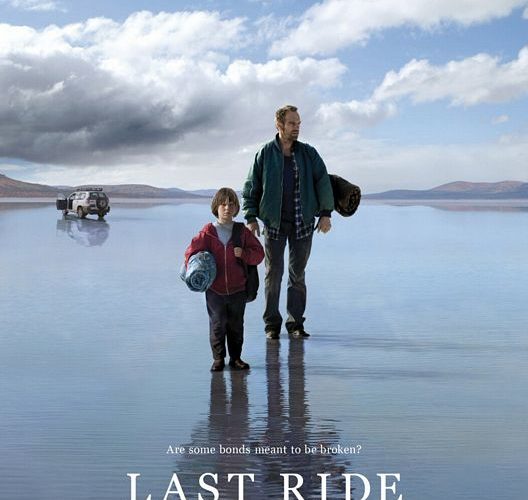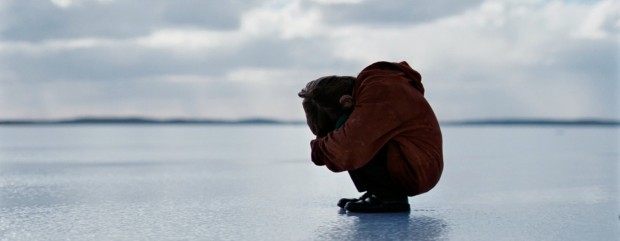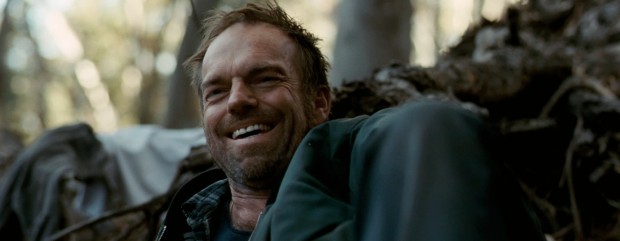If there’s nothing particularly flooring about the narrative of Glendyn Ivin’s Last Ride – based on a Mac Gudgeon screenplay, which itself was taken from Denise Young’s 2004 novel – the film finds its stirring pulse in the way it unhurriedly frames a wounded father-son relationship against the never-ending landscapes of the Australian Outback. There is something immediately powerful about observing these two souls march through such a vast territory, because it sets up such a compelling incongruity; as they are surrounded by all the vast open-space the world can offer, the tension between them builds mightily so that even when young Chook (Tom Russell) stands alone atop the immense, puddle-coated Lake Gairdner, a sense of claustrophobia still trickles in. They are freed by their surroundings, but paralyzed by their past.
In an opening scene, when we see Kev (Hugo Weaving) cut his hair and beard in the bathroom of a roadside eatery, we’re made aware of the fugitive circumstances. Kev’s done something illegal – probably something violent, judging by the damaged demeanor of his appearance – and his next course of action is to head for the wilderness with his son, where they will be suffocated in law-dodging isolation. This admirably barebones set-up paves the path for a film of deeply poignant resonance and, more frequently, overwhelming visual beauty.
Atmospherics aside, what’s also very impressive about Ivin’s effort – particularly because this is his first of the feature-length variety – is how consistently willing he is to drift away from storyline concerns. While the broad outline of events here may be unremarkable, this potential defect is made less of a drawback by the wordless stretches in which Kev and his son undergo psychological sparring matches simply by the combating attitudes with which they move through the photogenic vistas.
Sure, everything about the duo’s past is spelled out – both through flashbacks involving a man named Max (John Brumpton) and a present-day meet-up between Kev and Maryanne (Anita Hegh) – but even in these instances, Ivin doesn’t linger unnecessarily or settle for out-of-the-blue plot-twists. He shows us, economically, what we need to know to understand and leaves the rest to Weaving’s scarred face and Russell’s lurking aggression.
And two wonderful performances these are, sustaining a heavy burden in terms of how much they’re relied on for emotional identification and power. We not only believe in the expedition that’s happening at the present moment, but in previous expeditions that, in a metaphoric sense, may have been exactly the same. Through Russell and especially the skilled Weaving, we recognize that this relationship has long been a father-dominated one, and while their current circumstances may have the distinguishing trait of Kev’s outlaw status, this is hardly the first time Kev’s been an irresponsible parent. The sullen lack of urgency in Chook’s mobility hints at this – he’s been here before, and doesn’t like it.
The other star here is cinematographer Greig Fraser, and it’s wonderful for his sake that his miraculous work on Last Ride -which was first released in Australia in the summer of 2009 – is being distributed in the United States just in time to coincide with what is bound to be a breakout year. He’s already put his stamp on Snow White and the Huntsman, giving a tentpole-scale project a uniquely bleak aesthetic, and he’s also the lenser on two forthcoming films that seem primed to carry a distinct photographic quality: Andrew Dominik’s Killing Them Softly and Kathryn Bigelow’s Zero Dark Thirty.
It’s when Fraser’s choices don’t settle for surface prettiness – which, to his credit, is most of the time – that Last Ride is at its best, creating a memorable setting that engages with the characters in an ongoing conversation. When Chook walks across that frosty lake, cold and alone, and can do nothing but put his head down and weep, we come to a grave understanding about his situation. On that same ground, 99 out of 100 people would do nothing but drop their jaws in awe. Not Chook. His journey’s too desolate for sightseeing.
Last Ride is now in limited release.



